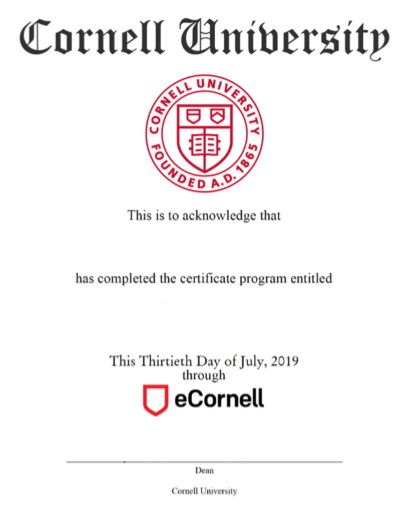Sustainability Workforce Transformation Programme

Cornell Certification:
Corporate Sustainability Certificate:

a) Evaluating a Corporate Sustainability Strategy (3 weeks, Self-paced, Online)
Course Overview:
In this course, learners will critically examine the sustainability-based interactions among corporate entities, their peers, regulators, the public, and other stakeholders in order to identify opportunities for improving the outcomes of these interactions. To do this, learners will examine how corporate structure affects business practices and how different industries are affected by the sustainability movement. Learners will then identify how these factors influence a company's motivation to act more sustainably. Learners will also consider the balancing act that today's corporate leaders face as they uphold their corporate fiduciary duties and navigate evolving sustainability demands. Finally, learners will assess the impacts of business activities on the environment and pinpoint a company's positive and negative sustainability efforts. By the end of this course, learners will be better prepared to assess their company's sustainability practices relative to industry standards.
Key Course Takeaways:
- Assess a corporation and analyze its sustainability motivation
- Examine the relationships between corporations and their stakeholders
- Assess the impacts of business activities on the environment
b) Sustainability Risk Management (3 weeks, Self-paced, Online)
Course Overview:
In this course, learners will identify sustainability risks associated with particular corporate activities and propose actions to mitigate these risks. To do this, learners will review a corporate 10k to evaluate and identify a company's identified risks. Learners will then examine ways that corporations disclose, report, and manage reputational risk. Finally, based on their previous findings, learners will develop several strategic corporate sustainability initiatives focused on a company and its key stakeholders. By the end of this course, learners will be better prepared to identify regulatory and reputational sustainability risks and develop strategies to mitigate these risks.
Key Course Takeaways:
- Critically examine sustainability risks associated with particular corporate activities
- Identify ways corporations disclose and report their sustainability efforts and manage reputational risk
- Propose solutions to mitigate these risks
c) Generating Profit in the Era of Sustainability (3 weeks, Self-paced, Online)
Course Overview:
In this course, learners will explore how values-informed purchasing and investment decisions, along with generational shifts in investment and consumption patterns, create opportunities for companies that adapt to trends in sustainability. Learners will also examine ways in which regulatory changes, growing scrutiny, and increased pressure by civil society create growing markets for products and services that have fewer impacts on people and the planet than conventional products and services. Building on this base, learners will identify how investment decisions can influence societal outcomes and how private, return-seeking capital can improve social and environmental outcomes by fostering more sustainable business activities. By the end of the course, learners will be prepared to propose sound sustainability initiatives or new sustainable business ventures that they believe represent real opportunities for a company like theirs to increase its profitability.
Key Course Takeaways:
- Identify business opportunities in sustainability
- Explore strategies businesses use to shift from being part of the sustainability problem to being part of the sustainability solution
- Propose ways the business can increase profitability through sustainable opportunities